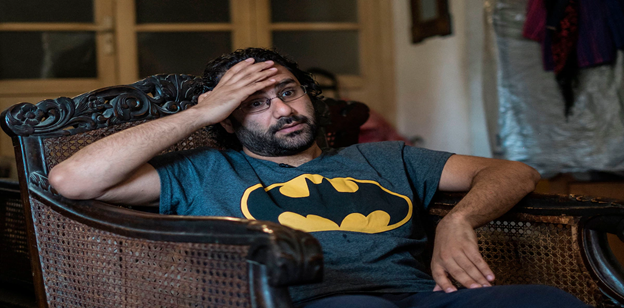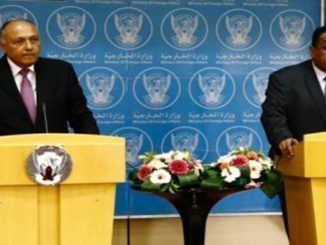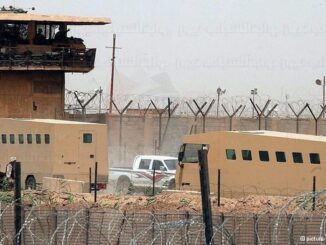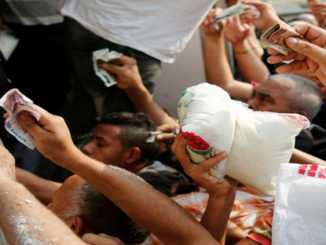
Alaa’s sister Mona Seif tweeted that if Egypt’s Abdel Fatah al-Sisi and new British Prime Minister Rishi Sunak “don’t resolve this he will die.”
As Abdel Fattah’s condition has worsened over the past month, pressure has increased on Egypt to release him and others ahead of the summit, known as COP27.
Climate activist Greta Thunberg visited Abdel Fattah’s family’s sit-in outside the Foreign Office in London, where another sister, Sanaa Seif, has been sleeping in a tent to demand a meeting with the foreign secretary. Dozens of British Parliament members have signed a letter in support of her request. Seif has also addressed the European Parliament, which in October adopted a resolution calling for Abdel Fattah and other prisoners of conscience to be released from Egyptian prisons before COP27.
On Thursday, U.K. Foreign Secretary James Cleverly tweeted that he had spoken with Abdel Fattah’s sisters on Wednesday night.
“We will continue to work tirelessly for his release,” he wrote.
“As Egypt hosts COP27, its most famous political prisoner may die, family warns,” John Casson, former British ambassador to Egypt, quotes Alaa Abdel Fattah’s family’s warning of his eminent death in prison.
“My brother just had his last glass of water in prison. Please keep his story alive, it’s not over. He can be saved. This afternoon I’m flying to Sharm, I have a civil society pass. The Egyptian regime claims civic space exists in COP27, I’ll be testing that,” says Sanaa Seif, sister of Alaa Abdel Fattah in a tweet.
Agnes Callamard, Secretary General of Amnesty International and Ex Special Rapporteur on ExtraJudicial Executions (2016-2021), commenting on this says in a tweet: “Alaa Abdel Fattah may die during COP27 unfairly arbitrarily imprisoned. His ordeal must stop. Egypt should release him now and let him leave the country. The world is watching.”
When world leaders arrive in Egypt for the U.N. Climate Change Conference next week, they will have to dance around a subject that the government here would prefer not to discuss: human rights, says Siobhán O’Grady, the Washington Post’s Cairo bureau chief, covering North Africa and Yemen.
Egyptian officials face mounting scrutiny over how the country can host the prestigious conference while thousands of people rights groups say were unjustly imprisoned remain behind bars — including Alaa Abdel Fattah, 40, a British Egyptian computer programmer and activist who has been on a partial hunger strike for more than 200 days.
The conference will take place in the coastal resort city of Sharm el-Sheikh, far from the prison outside Cairo where, on Tuesday, Abdel Fattah reduced his daily 100-calorie intake to zero in a desperate bid to draw more attention to his case. If he is not released by the time the summit begins Sunday, he has told his family, he will stop drinking water.
“So far British diplomacy has set the prime minister up to fail. When Rishi Sunak’s plane takes off to fly home from Sharm it will cross the skies over the prison where one of the most courageous of British men today lies dying. If Abdel Fattah is still in the jail on that day, he will die. Rishi Sunak needs to bring him back,” John Casson, the British prime minister’s foreign policy adviser from 2010 to 2014, and ambassador to Egypt 2014-2018.
“The Western diplomatic community is getting increasingly frustrated by the obfuscation and stonewalling” of the Egyptian government, said a Western diplomat with knowledge of the case who spoke to The Washington Post on the condition of anonymity because of the sensitivity of the issue.
“The likelihood of a substantial public statement is increasing,” the diplomat said.
Delegates traveling to Egypt for the climate summit have also expressed concerns that government restrictions on public gatherings will prevent attendees from protesting. At COP26 in Glasgow, Scotland, last year, some 100,000 people participated in a march calling for urgent action on the climate crisis — a number that would be unthinkable anywhere in Egypt, but particularly on the heavily secured Sinai Peninsula.
Rules surrounding public gatherings in Egypt — where mass street protests helped push out the government of President Hosni Mubarak in 2011 — are so strict that demonstrations are essentially nonexistent.
But the government is increasingly worried that the worsening economic situation here, including the recent devaluation of the Egyptian pound, could provoke a public backlash. Dozens of people have reportedly been detained in connection to vague calls for protests on Nov. 11 — the same day President Biden is expected at the summit.
A group of U.N. human rights experts said recently that restrictions on civil society “have created a climate of fear for Egyptian civil society organizations to engage visibly at the COP27.”
Abdel Fattah’s struggle for freedom has turned him into a symbol for the thousands of lesser-known political prisoners in Egypt’s notorious detention system.
A prominent activist during the 2011 revolution, Abdel Fattah — whose father Ahmed Seif el-Islam was a human rights lawyer and whose mother is a London-born math professor at Cairo University — has been jailed repeatedly over the past decade on various charges.
Most recently, in December, he was sentenced to five years in prison, convicted of spreading false news undermining national security — allegations human rights groups have decried as baseless, and an attempt to silence any criticism of Sisi.
State Department spokesman Ned Price expressed disappointment over Abdel Fattah’s sentencing — a sentiment Egypt’s Foreign Ministry rebuked as “inappropriate.”
Foreign interest in Abdel Fattah’s case has increased since he claimed British citizenship from prison last year. But Egypt has still not granted the U.K. consular access to him — even as British and Egyptian officials have worked closely together on planning for COP27 because of Britain’s role hosting last year’s conference.
“COP is around the corner. There’s always a chance of something happening,” said one academic in Egypt who spoke on the condition of anonymity because of the sensitivity of the case. But if Egypt released Abdel Fattah, the government might worry “that it looks like they buckled to pressure.”
President Biden vowed on the campaign trail in 2020 to hold Sissi to account over human rights abuses. Now, Abdel Fattah’s family hopes he will follow through.
Despite the international outcry, Sissi’s government is “not really getting the backlash it should for what has been happening with Alaa and what has been happening with political opposition and activists,” Mona Seif said in a phone call.
Unlike relatives of other prisoners in Egypt, who fear attention could worsen their chances of release, Abdel Fattah’s family has opted to speak out and openly criticize the governments involved, believing they can no longer afford to be silent.
With dozens of world leaders expected to arrive in Egypt in the coming days, they hope their efforts will pay off.
“You’re in the middle of this ongoing battle that doesn’t seem to end and you can’t really withdraw from it because they have one of the most important people in your life hostage,” Mona said. “So you are forced to continue.”



